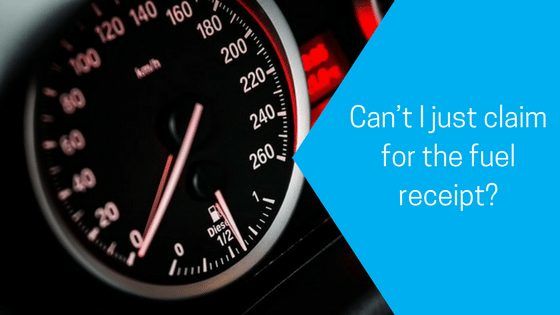When and how can you claim for fuel costs in your business?
If you are driving a company car, it’s likely that the fuel costs are covered by your company and you are paying a taxable benefit in kind on the fuel. You don’t need to separately claim for fuel costs – you may however want to record personal mileage and repay that to the company so that you don’t get taxed on the benefit in kind.
But I’m busy!
What happens when you are a busy entrepreneur and you are using your own car for business miles?
Although you really mean to keep good records – sometimes you are just too busy to be working out the exact mileage of where you’ve travelled to and from in relation to your business.
So can you just claim for the odd tank of fuel instead.
In short. No.
As an employee of your company you are only allowed to claim mileage at the approved mileage rates published by HMRC. These are called Mileage Allowance Payments or MAPs.
HMRC MAPs
HMRC has clear rules for claiming mileage expenses. At the time of writing, you are allowed up to 45p per mile tax-free for every business mile you travel in your personal car.
- 45p for the fist 10,000 miles travelled
- 25p for every mile thereafter
Unless you can prove that you used the full tank of fuel that you purchased with your fuel receipt for business miles, say for example you put a tank of fuel in a hire car, or perhaps the car is parked at the business premises and is never used for personal mileage – then you cannot claim for the fuel receipt. If you cannot prove that you only used the car for business then HMRC will assume that there is a level of personal benefit in the tank of fuel you’ve claimed and you will be taxed on it. Better that you calculate your actual usage than HMRC assume your usage – this will never be calculated in your favour!
If the company is reimbursing personal expenses on fuel or paying rates above the published MAPs rate of 45p per mile then this must be recorded in a P11D as a benefit in kind and taxed accordingly.
To avoid the whole debate of how many personal or business miles you may or may not have travelled in your car you must record actual business mileage.
The onus is on you to prove your mileage to HMRC – it is not up to HMRC to disprove the mileage. In the event of an audit they will simply disallow the spends and charge you for any unpaid tax – plus interest and penalties of course!
Profit Extraction – taking money out of your business tax efficiently
The 45p per mile allowed by HMRC allows for an element of wear and tear on the car, insurance, tax, tyres and general repair costs. Assuming your company can afford it claiming the 45p per mile will always be more financially beneficial to you. This is an effective way of extracting profits from your company as the full cost of the mileage claim is allowed for tax.
Can I claim VAT on my Mileage Claim?
Yes, but…..
- you CAN’T claim VAT on the full 45p per mile (which includes a contribution towards your MOT, car tax ,tyres and insurance etc)
- you CAN claim VAT on the fuel element itself
Again HMRC publishes rates, called Advisory Fuel Rates – on which we are allowed to reclaim VAT. These are updated each quarter.
Lets consider an example and look at the accounting entries.
| # | Bob drives 100 miles in his own car which has a 1600cc petrol engine. He wants to make a mileage claim for the journey and recover the VAT against the cost in his accounts.
His claim is dated October 2015 so he will use the current rates allowed by HMRC and published on their website. He has made mileage claims of 1250 miles since 06-April-2015 so is well under the 10,000 mile threshold for MAPs at 45p in this tax year. |
| 1 | Bob makes a mileage claim for 100 miles at 45p per mile.
100 x 45p = £45.00 |
| 2 | He checks the published rates to see how much of the 45p is the fuel element is fuel and finds it is 14p for a petrol car with a 1600cc engine. |
| 3 | He calculates the fuel element of the claim
100 x 14p = £14:00, so the non fuel element must be £31.00 |
| 4 | He calculates the VAT element of the fuel claim
£14.00 x 1/6 (20/120) = £2.33, so the amount before VAT must be £11.67 |
| 5 | He enters his mileage claim into his accounting system as follows:
|
The double entry in his accounts will look like this:
| |
||
| Transaction | Debit | Credit |
| Mileage at 20% VAT (P&L) | 11.67 | |
| Mileage with no VAT (P&L) | 31.00 | |
| VAT (BS) | 2.33 | |
| Bobs expense account (this could also be credited to his directors loan account) | 45.00 | |
| Total | 45.00 | 45.00 |
Look out for:
|
|
| # | Look out for: |
| 1 | Keep Fuel Receipts
Although you are allowed to recover the VAT on fuel claims, you must still prove to HMRC that you actually bought fuel during the claim period. Although you won’t enter them into your system – you must keep copies of VAT fuel receipts with enough VAT to cover the claim you are making, with your accounting record s . If you use Xero, you can scan these alongside your mileage claim. |
| 2 | Maintain Adequate Records
Keep sufficient records to evidence your business trip:
It might seem like a lot of effort, but the better your records are now – the easier it will be to defend any kind of challenge in a VAT audit later. |
You can see that by making sure the record keeping is right – you can avoid unnecessary stress with HMRC and recover VAT on your mileage claims.
💡 Top Tips for mileage tracking |
|
| # | |
| 1 | Keep a notebook in your car to record business mileage |
| 2 | Keep records of all appointments and journeys in your diary just in case you need to refer back later |
| 3 | You could set yourself up as a supplier in your accounting software and record your mileage as a bill – payable as and when you have the funds. Keep the bill as draft throughout the month and approve it at the month end when you have recorded all of your business trips. |
| 4 | If your business software has expense claim functionality – you could log each trip as an expense claim and submit it for payment at the end of each month. |
| 5 | Download an app onto your phone such as TripCatcher and log your mileage as you go. If you use Xero, you can submit your mileage claims directly to your Xero account. |
Don’t leave it until the tax man comes to visit before you record your business miles! Put robust procedures in place now.
Caseron Masterclasses
If you'd like to take a deeper dive into this topic, take a look at our bloody brilliant business expenses masterclass.
This masterclass covers the A-Z of business expenses. Learn which expenses can be put through your business, which are tax-deductible and which are not. Understand different accounting treatments for limited co and sole trader entities.
If you would like to get access to all of our Masterclasses, tutorials, workbooks, checklists and cheatsheets - our PROFIT HACKERS membership club is for you!





